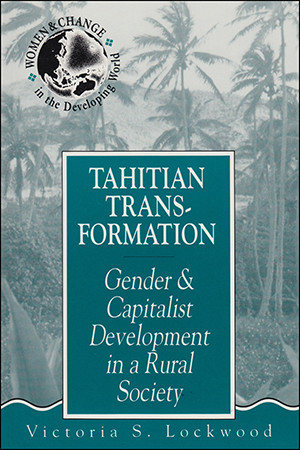Victoria S. Lockwood
As culturally diverse, non-Western communities are drawn into the international division of labor, capitalism takes root in a number of ways. This book describes how capitalism has become a part of the lives of rural Tahitians, starting with the arrival of Westerners to the islands and detailing the nature of the transformation wrought by missionaries, merchants, and French colonizers—transformation whose pace has accelerated with the islands' rapid modernization and incorporation into the French welfare state.
Lockwood's analysis of the impact of capitalism centers around two major themes in Third World development: the structural changes that take place in non-Western socioeconomic systems as capitalist methods of production overwhelm indigenous economic organization; and the nature of the increasing social, economic, and political subordination of women that accompanies Westernization.
An excellent example of the historical-materialist approach, this book is written in a style that makes it accessible to undergraduate students.
Victoria Lockwood is associate professor of anthropology at Southern Methodist University. She is coeditor (with T. Harding and B. Wallace) of Contemporary Pacific Societies: Studies in Development and Change.
"Refreshingly accessible.... This book will make a marvelous text for anyone teaching, especially at the undergraduate level, about Oceania, economic anthropology, "development," or the complex linkages between political history and economic structures.... A model of what ethnography can be."—The Contemporary Pacific
"A clearly written, clearly structured case study, Tahitian Transformation outlines basic theoretical concepts in political economy, clarifies debates in dependency and world systems theory, and provides a detailed historical and ethnographic portrait of capitalist development in a Pacific island society.... Useful for all levels of undergraduate teaching especially in courses on the Pacific, and development."—Pacific Affairs
"Victoria Lockwood's highly readable case study. . . . is especially welcomed, since most of the economic development literature on the Pacific Islands has ignored women."—Feminist Collections
"An excellent, straightforward ethnographic account of the political economy of a Tahitian village. . . . Link[s] the closely observed village system to the larger regional and world political economy. . . . This account of underdevelopment is nuanced by specific treatments of French policies and plans in Tahiti and the neocolonial politics that result. Also valuable for its presentation of political economy at the household level and of how it has altered over time to parallel changes in the world and regional systems. The changing nature of gender stratification and relations is a special feature of this look at household political economy."—Choice
"An accessible, contemporary ethnography that melds gender concerns with timely political and economic issues. . . . avoids the `isolated village study' quality of so many other ethnographies."—Christine Ward Gailey






